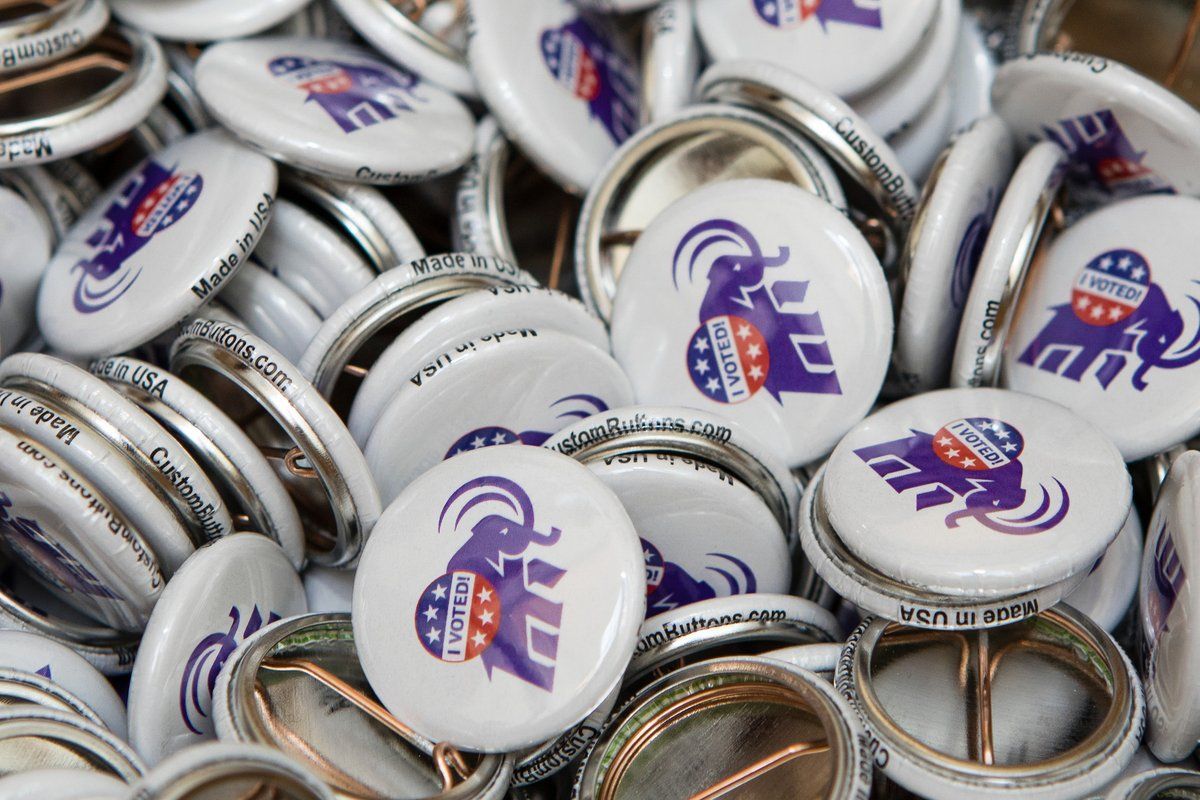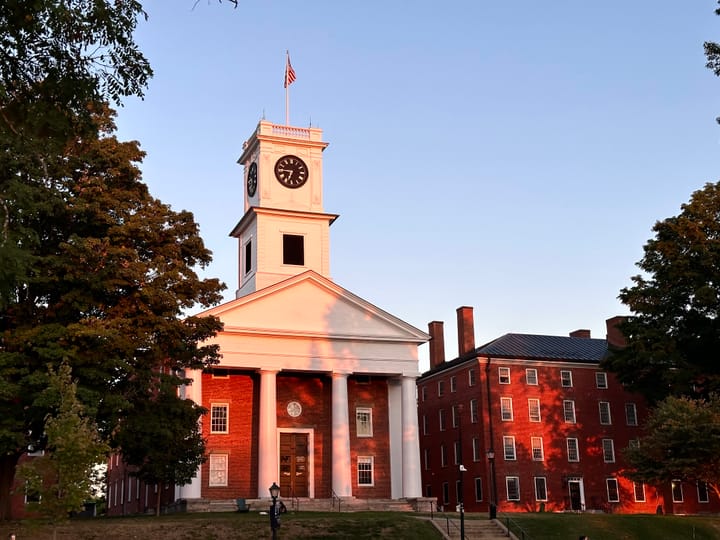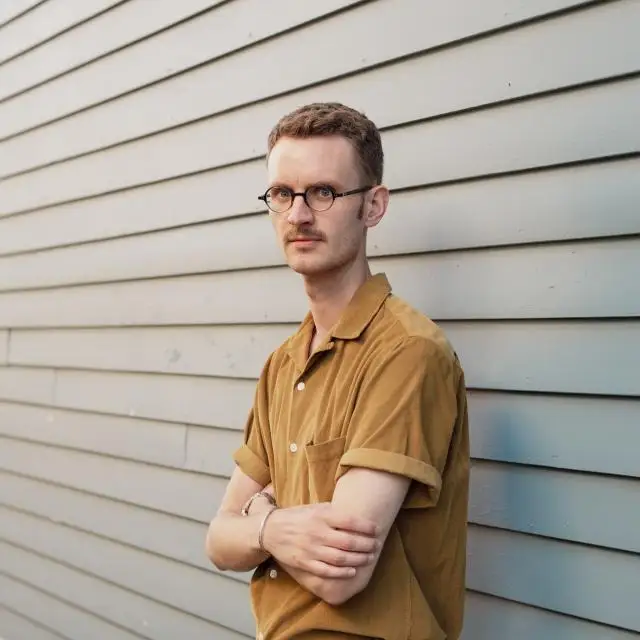AC Votes Panel Discuss November Election
AC Votes hosted a panel of faculty from varying departments to discuss the upcoming election. The event gave students the chance to learn more about the issues at the center of this year's election.

AC Votes sponsored a panel of faculty from a range of disciplines to discuss the upcoming election last Tuesday, Oct. 8, in the Lyceum.
The event, which was moderately well attended, sought to provide a chance for less politically-engaged students to learn more about the central issues of the election. The panelists discussed topics pertaining to their respective fields before fielding questions from the attendees.
“We wanted to create a space that felt like anyone who wanted to come could come, and you didn’t have to be an expert in anything. You would just learn something,” said Dean of New Students and Associate Professor of American Studies Kiara Vigil, who moderated the event.
The first speaker, Professor of Economics Adam Honig, discussed the economic policies of both Vice President Kamala Harris and former President Donald Trump. Although Honig said that both parties need to pay more attention to fiscal responsibility, he said of Trump’s proposed tariffs of up to 20% on all imports that “[i]t’s hard to think of a more inflationary platform than the one that he is suggesting.”
“In general, trying to make everything yourself, as Trump seems to want, is the North Korean model, and it does not produce much resilience or prosperity,” Honig said.
Although Honig noted that Harris also supports imposing some tariffs, he said that Harris’ were comparatively targeted.
Javier Corrales, a professor of political science, shifted gears with a discussion of how Trump’s candidacy poses a unique threat to liberal democratic institutions.
As a scholar on Latin American politics, Corrales noted similarities between Trump’s rhetoric and policies with illiberal politicians in the region.
“I can tell you, the signs of illiberalism — open, not even hidden — coming from the Republican campaign are very obvious.” Corrales said. “For me, that is the key issue. There are so many other policy issues, but this is why this election is so existential for the United States.”
Assistant Professor of American Studies Angus McLeod then spoke on specifics of educational policy. McLeod discussed Trump’s plans to abolish the Department of Education, which would greatly decrease the power of the federal government in regulating schools. Trump’s proposed policies also include fighting what he calls “critical race theory” and “radical gender ideology,” promoting patriotic education, and creating “American Academies” as an alternative form of higher education funded by taxing and fining endowments of “anti-semitic universities.”
McLeod added that Trump had some policies that those on the left might agree with, such as supporting Historically Black Colleges and Universities (HBCUs) and reforming how the government rates institutions of higher education based on the types of students attending.
On Harris’ policies, while commenting that a lot of her platform was “vague and full of platitudes,” McLeod pointed to specifics such as free universal preschool, tuition-free trade schools and community colleges, supporting HBCUs, and protections for LGBTQ+ students.
Lloyd Barba, assistant professor of religion, turned to the concept of sanctuaries in the context of immigration in America. Throughout the past few decades, churches often served as refuges for immigrants to avoid deportation. The number of churches calling themselves sanctuaries grew in response to the Trump administration’s policies on immigration, amounting to over a thousand by 2018.
Barba also touched upon the rise of sanctuary cities during the Trump presidency that refused to cooperate with Immigration and Customs Enforcement. Despite efforts to attack them, Barba said that sanctuary cities often had better track records on crime, since undocumented migrants could report crimes to the police without fear of deportation.
Barba made a prediction if Trump were to win a second term: “We’ll see another concerted effort to dismantle sanctuary cities, but we’ll also see a robust response from colleges, houses of worship, and city officials, state officials across the country proclaiming sanctuary.”
Lawrence Douglas, professor of law, jurisprudence and social thought, summarized his criticisms of the electoral college. Douglas pointed to the fact that a president can be elected while losing the popular vote and that the value of certain states’ votes is greater than others.
“I would try to neutrally describe that process as anachronistic, dysfunctional, and dangerous,” Douglas said.
Following Douglas’s comments, the panel fielded audience questions.
One student wondered about a possible recurrence of Jan. 6. Douglas argued that the greatest risk to the electoral process isn’t another attempt to stop the certification of electors in January, but the obstruction of voting tallies. If local or state officials interfere with this process, it could be impossible for states to give their electors definitively to one candidate or another.
“It’s not so much necessarily that the state declares itself falsely for Trump, but that they are just unable to resolve who won the election in the state, then you’re really looking at potentially a world of hurt, and civic unrest. That is a real danger,” Douglas said.
Jeb Allen ’27, a staff writer for The Student, appreciated hearing from all of the panelists’ perspectives, particularly Honig’s discussion on the economy.
“I think a lot of Americans are uncertain, and a little bit bought in, on Trump’s notion that he would be better for the economy. It was very interesting hearing a genius like Professor Honig go through them and say, ‘No, these are terrible ideas.’ It’s populist rhetoric,” Allen said. “I think Harris has some populist economic ideas as well. But it was very interesting to hear him go through and explain how each [policy] would have horrible consequences for the national economy.”
Vigil has a simple call to action for those who attended the event. “Hopefully they feel like if they aren’t registered to vote, they want to, if they’re eligible to. If they’re not, maybe they just want to support their friends in the process.”





Comments ()